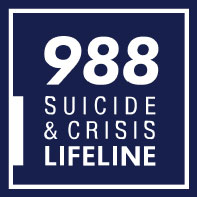Need help now? Call 911 if you are in an emergency.
____________________________________________________________________________________________________
-
 New! WA 988 Suicide & Crisis Lifeline website - Washington specific mental health resource, including many specifically designed for priority populations.
New! WA 988 Suicide & Crisis Lifeline website - Washington specific mental health resource, including many specifically designed for priority populations. - The WA 988 Lifeline is free, confidential, multilingual, and available 24/7/365 via phone call, text , or online chat - WA 988 Suicide & Crisis Lifeline. Call or text 988
Contact the Need Help Now crisis line 24/7/365 to get help for you or someone else and connect to local resources:
1-888-910-0416
Go to imhurting.org for a 24/7 chat line and other help for you, your friends and family.
About the Need Help Now hotline:
Do you need help or know someone who is struggling with crisis? Call the Salish Regional Crisis Line at 888-910-0416 any time night or day to talk to someone who can provide emotional support for you, your family and friends during times of crisis. Everyone is welcome to talk about what's causing them to feel pain. Crisis counselors will listen to you without judgment and help you feel cared about and safe.
Kitsap Mental Health 24/7 Crisis Services
Contact Kitsap Mental Health Crisis Services for information to support individuals and families in mental health crisis.
How to know and what to do if someone is considering suicide:
> Click here for steps you can take if you know someone who is considering suicide.
> Click here for help in identifying risk factors and warning signs that someone is considering suicide.
Other 24-Hour Crisis Lines & Resources
> National Suicide Prevention Hotline: 9-8-8
> LIFELINE Online Chat: Suicide Hotline Chat
> People who are deaf, hard of hearing, and TTY users should use your preferred relay service or dial 711 then 1-800-273-8255.
Looking for a provider? Find services near you here.
Suicide Prevention Resource Center
Black, Indigenous, and people of color (BIPOC)
> Mental Health America's list of BIPOC Mental Health Resources. Visit Mental Health America for additional resources.
YOUTH
> NAMI Teen and Young Adult Helpline. Free nationwide teen and young adult peer-support service providing information and resource referrals. Reach out by phone 1-800-950-NAMI (6264), text 62640, or chat. Available Monday through Friday, 10 a.m. - 10 p.m. ET
> Teen Link: If you're under 21, you can call Teen Link at 866-TEENLINK (866-833-6546) and ask to talk to a peer
> Coffee Oasis Text Line: For youth age 13-25 years old experiencing a crisis or just needs to talk. Text "CoffeeOasis" to 360-377-5560
> The Trevor Project: Confidential hotline for LGBTQ youth in crisis, feeling suicidal, or in need of a safe and judgment-free place to talk. Call 1-866-488-7386 or text START to 678678
FAMILIES
> I'm Hurting.org: Help with mental health, sexual assault, bullying, eating disorders, other self harm and much more.
> Washington State Suicide Prevention & Crisis
NATIVE AMERICANS
> Washington's Native and Strong Lifeline is available by calling the 9-8-8 Suicide & Crisis Lifelife. Calls answered by Native crisis counselors who are tribal members and descendents of their communities, trained in crisis intervention and support with emphasis on cultural and traditional practices related to healing.
VETERANS
> Veterans Crisis Line: Dial 9-8-8 and Press 1 or Text 838255. Online chat available Veterans Crisis Line Chat
> To learn more about the issue of Veteran suicide as well as VA mental health resources, please visit www.mentalhealth.va.gov.
VICTIM'S SUPPORT
> YWCA 24-Hour Domestic Violence Hotline 1.800.500.5513 or Text Line 360.277.7607
> Scarlet Road's Survivor Support Line 360-362-5143 for anyone who is or has experienced sexual exploitation.

